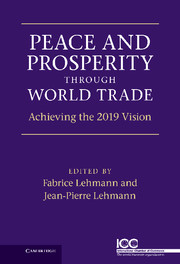Book contents
- Frontmatter
- Contents
- Notes on contributors
- Foreword
- Preface: the ICC vision
- Historical overview and dynamics
- Editorial note
- A Global systemic transformations
- B Governance of global trade
- C Poverty and global inequities
- D The long view on interlocking crises
- E Global business responsibilities
- Conclusion: the imperative of inclusive global growth
- Index
Preface: the ICC vision
Published online by Cambridge University Press: 05 July 2011
- Frontmatter
- Contents
- Notes on contributors
- Foreword
- Preface: the ICC vision
- Historical overview and dynamics
- Editorial note
- A Global systemic transformations
- B Governance of global trade
- C Poverty and global inequities
- D The long view on interlocking crises
- E Global business responsibilities
- Conclusion: the imperative of inclusive global growth
- Index
Summary
In 1919, in the wake of World War I, a group of business leaders from Belgium, Italy, France, the UK and the USA, met in Atlantic City, New Jersey, to found the International Chamber of Commerce (ICC). They identified themselves as ‘merchants of peace’ and adopted the motto ‘world peace through world trade’. The following year, under the aegis of the French statesman and entrepreneur Etienne Clémentel, the ICC established its headquarters in Paris, where it has remained ever since. The ICC mission from its inception was to champion an open global economy as a force for economic growth, job creation and prosperity. These three elements, reasonably distributed, are the fundamental ingredients for peace.
In the tenth year of the ICC, in 1929, the Great Depression occurred and in the twentieth year, 1939, World War II broke out. In the intervening decade the global economy contracted dramatically as countries engaged in trade wars and unemployment soared. Though the causes of World War II are obviously multiple and complex, there can be no doubt that the breakdown of trade and the surging protectionism that ensued were important causal factors.
On the thirtieth anniversary of the ICC, in 1949, the world economy seemed to be back on track. Following the first round in Geneva in 1947 that formally established the GATT (General Agreement for Tariffs and Trade), a second round was launched in the French city of Annecy, which proceeded to expand membership and reduce tariffs.
- Type
- Chapter
- Information
- Peace and Prosperity through World TradeAchieving the 2019 Vision, pp. xxi - xxivPublisher: Cambridge University PressPrint publication year: 2010
- 1
- Cited by

